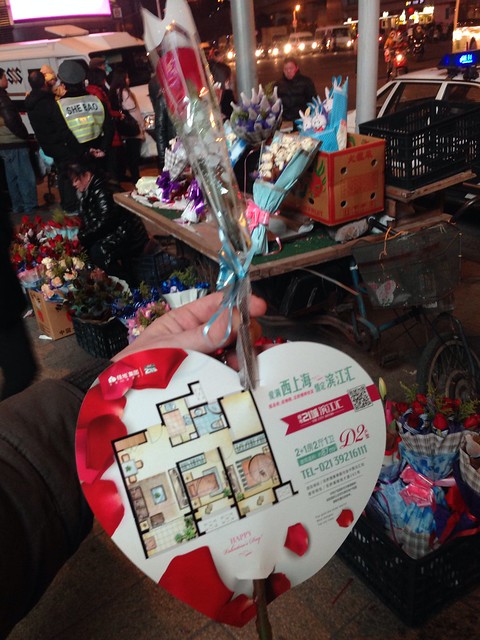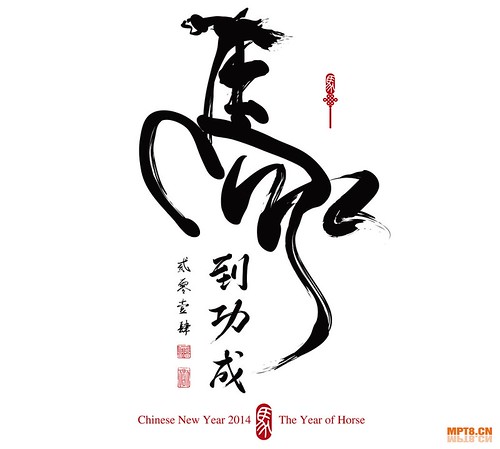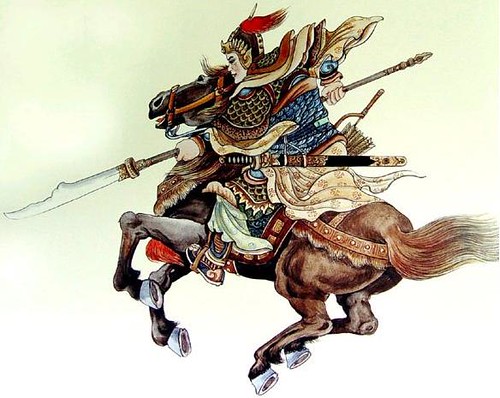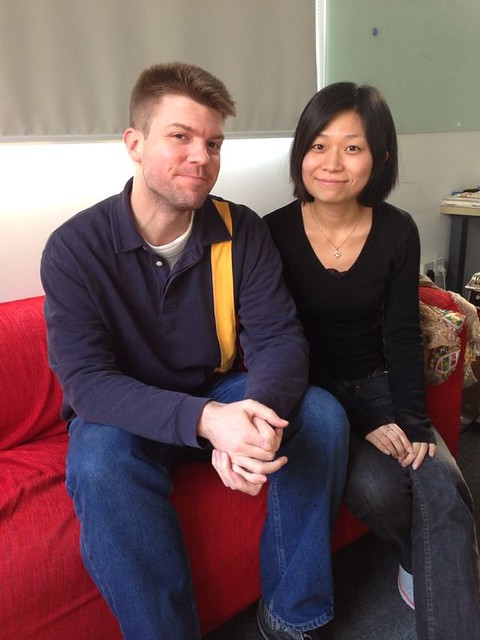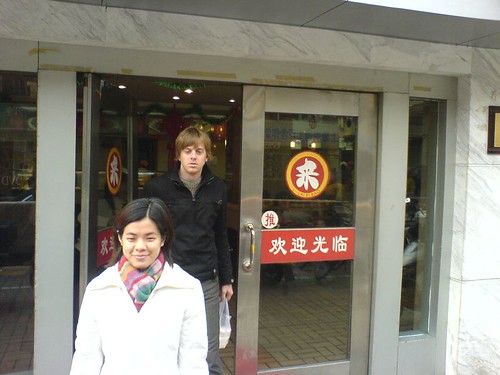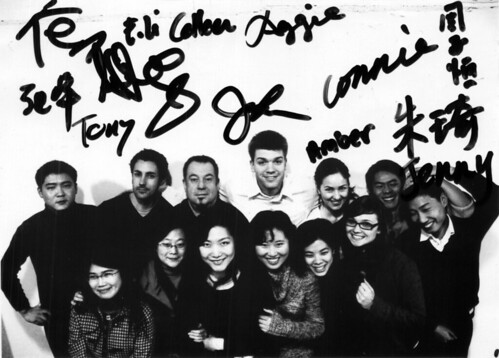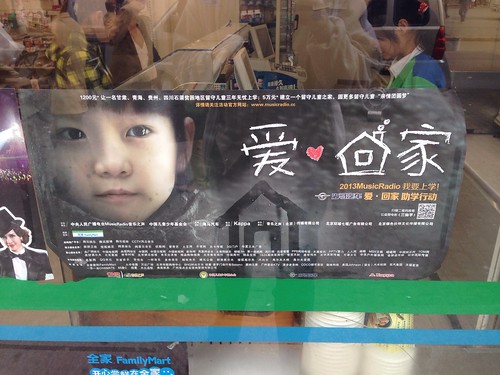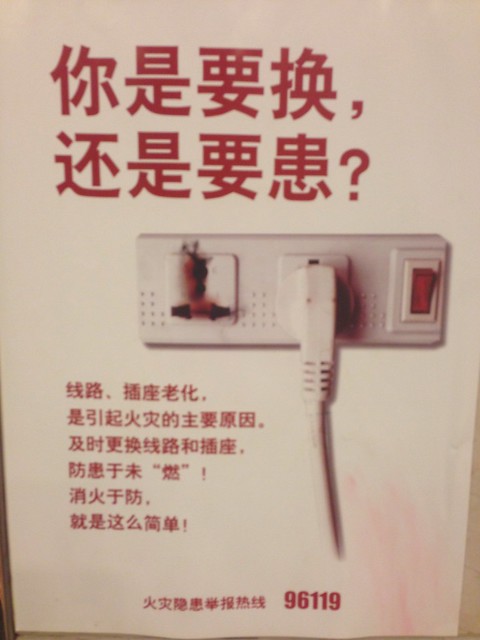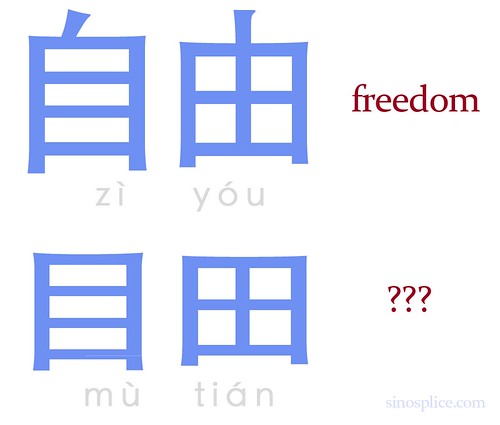21
Feb 2014Letters Embedded in Characters
Here’s a creative use for the alphabet:
The Chinese reads:
> 笨苹果的
英语
学习法
…or, “Stupid Apple’s English Learning Method.”
(Hopefully it’s not just hiding letters in Chinese characters.)
19
Feb 2014V-Day Marketing Opportunism
I’ve grown accustomed to interesting examples of Chinese capitalism (I often say the Chinese are more capitalist than us Americans), but I was presently surprised to see this (sorry it’s not the greatest photo):
So on Valentine’s Day, demand drives the price of roses up to something like 30 RMB per flower (give or take). Normally it’s around 10 RMB (which is already kind of high).
Well, this real estate developer decided to give away free roses on the evening of February 14th, right on the street near Zhongshan Park, with this heart-shaped advertisement attached. Quite clever!
I know for a fact that most people immediately removed the ad and kept the rose, but I do wonder if the tactic proved fruitful for them or not.
13
Feb 2014A Pinyin Typing Shortcut for Crazy Characters
Pinyin is generally great for typing (learn it!), but there’s not much it can do for you when you’re trying to type a character you don’t know how to pronounce. This has always been the case, until recently, when a few of the popular pinyin input methods have started adding a few new tricks.
Basically, you first type “u” (a letter no valid pinyin syllable begins with), and then you type out the common names of the character components. You can see it in action in the image (the apostrophes are inserted by the pinyin input method itself to show how pinyin syllables are interpreted).
More text-friendly breakdown of what the image shows:
– 壵 (zhuàng) = 士 (shì) + 士 (shì) + 士 (shì) = u’shi’shi’shi
– 磊 (lěi) = 石 (shí) + 石 (shí) + 石 (shí) = u’shi’shi’shi
– 渁 (yuān) = 氵 (sāndiǎnshuǐ) + 水 (shuǐ) + 水 (shuǐ) = u’shui’shui’shui
– 淼 (miǎo) = 水 (shuǐ) + 水 (shuǐ) + 水 (shuǐ) = u’shui’shui’shui
– 萌 (méng) = 艹 (cǎozìtóu) + 日 (rì) + 月 (yuè) = u’cao’ri’yue
The bad news is that this doesn’t seem to work on Mac OS X or iOS. I hear from reliable source that it works on Sogou pinyin for PC and Google Pinyin (for PC). Does it work on Android devices running Google Pinyin?
Let me know in the comments if it works for you, and share some interesting examples of what works and what doesn’t work. Thanks!
07
Feb 2014The Year of the Horse Chengyu
This is my second “Year of the Horse” Chinese New Year in China, and there’s one thing I’ve noticed: a certain chengyu (Chinese idiom, typically 4 characters long) gets thrown around like crazy in Chinese New Year’s greetings.
That chengyu is 马到成功.
There are a few interesting things about this chengyu, and some points worth exploring.
Is it worth knowing?
Like many learners, you may not want to junk up your brain space with too many useless chengyu. So is this one worth it? Well, it sure gets liberally tossed around at the beginning of the Year of the Horse, that’s for sure.
But aside from that, it’s not a terribly uncommon chengyu. I’ve learned it without trying just by living through one Year of the Horse CNY, and you probably can too, if you live in China or if you’re tuned into Chinese media for the holiday. Tons of repetition of this chengyu.
What does it mean, really?
The nice thing about 马到成功 is that its components are so easy:
– 马: horse (easy!)
– 到: to arrive (easy!)
– 成功: to succeed (not bad, intermediate-level vocab)
It’s all high-frequency vocabulary, so that’s great. What does it really mean, though? “Horse arrives, success!” Something is missing. Is there some mystical luck-horse that runs around providing success to all it encounters? Not exactly.
If you look up 马到成功 in a dictionary, you get something like this:
> win instant success
Or, more literally:
> win success immediately upon arrival
OK, so if you take 马到 to mean “instant,” than isn’t it just the same as 马上, “immediately?”
But it’s not. At Chinese New Year, the chengyu is used in New Year’s wishes to others. If you were wishing people “马上成功” it sounds like they’ve already started something, and you want them to succeed immediately (like really soon!). Wishing them 马到成功 is wishing a speedy success to whatever endeavor someone undertakes. That makes a lot more sense.
OK, but does that explain why it’s 马到? Not really. Fortunately Baidu has the answer (in Chinese, of course). The chengyu actually refers to ancient warfare, in which cavalry played an important role. If your cavalry could get there on time right as the battle began, you’d frequently be assured a swift victory. (There’s a more complicated story behind the chengyu which Baidu relates, but it’s related to cavalry.)
This isn’t to say that Chinese people have images of cavalry slaughtering their enemies as they wish their friends 马到成功. In fact, most Chinese people probably aren’t aware of the origin of the saying. If you Baidu image search it, you see a whole bunch of images of horses frolicking around, not an enemy soldier in sight.
Using it
Even though the 马到成功 literally means “swift success,” you can also use it by itself to wish someone success in the New Year. You don’t need to add 祝你 in the front for “I wish you” (even though it’s not wrong to say that).
A common greeting that won’t stretch any intermediate learner’s abilities is:
> 新年快乐,马到成功! (Happy New Year, and swift successes!)
And with that, I wish everybody a 马到成功 in their Chinese studies!
04
Feb 2014May the Horse Be With You
I wasn’t expecting Star Wars to get in on the CNY festivities, but here it is:
The pun is (in traditional characters originally):
> “星”年快樂
In simplified, that’s:
> “星”年快乐
新年快乐 means “Happy New Year.” The pun replaces 新 (xin: “new”) with 星 (xing: “star”). The two are both first tone, and do sound very similar in Chinese (in fact, many native speakers don’t carefully distinguish between the “-n” and “-ng” finals of many syllables), and Star Wars in Chinese is 星球大战 (literally, “Star War(s)”).
Thanks, Jared, for bringing this video to my attention!
28
Jan 2014Advertising the Year of the Horse
It’s almost the Year of the Horse (马年) in China, and you can see it in advertising all around China. Here are three examples from Shanghai:
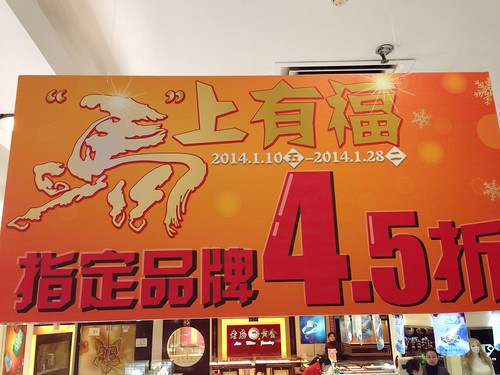
This first one incorporates the traditional character 馬 (horse) into the design.

Using the word 马上 (literally, “on horseback,” it means “right away”) is the easy way to go.

This one uses the internet slang 神马 (literally, “god horse”), which is sometimes used in place of 什么 (“what”).
Happy Year of the Horse!
23
Jan 2014Chinese Grammar Points Used by a 2-year-old
My daughter is now two years old, and she’s well on her way to simultaneously acquiring both English and Mandarin Chinese (with a little Shanghainese thrown in for good measure). We’re using the “One Parent One Language” approach, and it’s working pretty well.

I’ve taken a keen interest in my daughter’s vocabulary acquisition, but recently I’ve also been paying close attention to her grammar in both English and Chinese. Those that follow the debate regarding order of acquisition and whether or not a child’s natural acquisition should be closely mirrored by language learning materials should not be surprised to learn that her grammar pattern acquisition is all over the place. What I mean is that the grammar patterns she can or cannot use do not match well to what a beginner learner of Chinese should or shouldn’t be able to use after a year of study.
So what I’m going to do in this post is briefly comment on her mastery of some well-known grammar points, and also highlight some of the more surprising ones. I’ll be using the Chinese Grammar Wiki’s breakdown by level for reference (the order, low to high, is: A1, A2, B1, B2).
Grammar Points My Daughter Can Use
- Measure word “ge“ (A1)
So she’s counting things the Chinese way, with 个. Picked this one up pretty quick, it seems. - “Er” and “liang” (A1)
I was wondering how quickly she’d master the use of 二 and 两, but she had it down easily, before she was two. (Obviously, she has no need for most of the fringe cases; she just needs to count stuff.) I know her waipo (maternal grandmother) practiced this one with her a lot. - Expressing possession (A1)
It took her a while to get the hang of 的 for possession, just as it took her a while to get the hand of “‘s” for possession in English. Neither is totally consistent (she sometimes forgets to use them), but she’s basically got them down. - Questions with “ne“ (A1)
When an adult learns Chinese, you learn the pattern “____ 在哪儿?” to ask where something is. My daughter totally skipped that, and uses 呢 exclusively to ask where things are. This is a use of 呢 you don’t normally learn as an adult student of Mandarin until a bit later, but there’s no arguing that it’s simpler! Kids like linguistic shortcuts. - “meiyou” as a Verb (A1)
She doesn’t know that 没 is a special adverb of negation used with 有. She just knows what 没有 means as a whole. And it works! - Negative commands with “bu yao“ (A1)
Yeah, two year olds can be a bit demanding and uncooperative. 不要 is a key tool in her arsenal of terribleness, and it’s one of the few Chinese words that she likes to use when she’s otherwise speaking English, as well. - Standard negation with “bu“ (A1)
Again, very useful when she wants to be contrary. She uses 不 pretty indiscriminately, putting it in front of verbs, verb phrases, and adjectives, but sometimes also nouns. - Expressing “with” with “gen” (A2)
I say she “knows” this, but she uses it exclusively with the verb 去, for talking about “going with (someone).” Again, it gets the job done! - Change of state with “le” (A2)
This is another one of those grammar points that she has a very limited mastery of, but makes good use of. She knows and uses the phrases “来了,” “走了,” and a few others. (Interestingly, she often uses “来了” as a substitute for the existential 有, meaning “there is.”) - Negative commands with “bie” (A2)
Again, a great pattern for the terrible twos. - Reduplication of verbs (A2)
She uses this with specific, high-frequency verbs, like 看 (看看). - “-wan” result complement (B1)
Obviously, she has no clue how to use complements. She learns phrases, and the phrase “吃完了” gets used a lot. (Her English equivalent for this is “finished” or “done,” not “finished eating” or “done eating.”) - Expressing the self-evident with “ma“ (B1)
嘛 (not 吗) is notoriously tricky for adults to get the hang of, but my daughter jumped right in and started using it early. Sometimes it feels like she’s not using it quite right, but clearly that doesn’t faze her. You’ll notice that any Chinese 3-year-old uses 嘛 pretty liberally, so it’s clearly something that kids pick up really quickly, and adult learners over-analyze.
Grammar Points My Daughter Cannot Use
- Personal pronouns (A1)
This might seem surprising, but these ubiquitous, abstract words for expressing “I” (我), “you” (你), and “he/she/it” (他/她/它) are totally unnecessary in the beginning and ignored by kids for quite a while. My daughter is just know starting to use “I” and “我,” but she’s still just experimenting. (Previously, she used “baby” and her own name instead of “I.”) - “Can” with “hui” “neng” and “keyi” (A2)
Here’s something elementary learners spend quite a bit of time mastering, but my daughter has decided to shelve the use of modal verbs 会, 能, and 可以 altogether, for the time being. (She seems to be making some progress on English “can,” however.) - Basic comparisons with “bi” (A2)
Doesn’t need it, doesn’t use it. She confines her “comparisons” to just nouns and adjectives. - “Shi… de” construction (B1)
Yeah… doesn’t need 是……的, doesn’t use it. She hears this pattern in questions all the time, however. She’s slowly soaking up the input. - “Ba” Sentence (B1)
This one is notoriously difficult for adult learners, and kids avoid it for a while, too, as it turns out. My daughter definitely understands the structure, though, whether or not she even notices the presence of 把 in the sentences she understands. She never uses it. - “Bei” sentence (B1)
She definitely doesn’t use 被. No need for passive at all, and she doesn’t hear it much either, at this point. I’m sure linguists have studied at what point kids acquire passive constructions and why, but it’s clearly a lower linguistic priority for kids.
Conclusions
None of this is scientific; these are just casual observations. Watching my daughter simultaneously acquire two languages, I’ve done a lot of thinking about the differences between the way children and adults acquire languages. Whether or not there are neurological limits is still being debated, but it’s clear to me that there are differences, in practice.
What I’m seeing:
- Kids can get by without pronouns. Without pronouns! How many adults could do that, even after being told they’re not high priority? I’ve personally observed quite a few people that try to start learning a language by translating the English of what they want to say, and their first question is frequently, “how do I say ‘I’?” You don’t need to start this way, but adults feel they need to.
- My daughter was not at all tripped up by measure words, but after mastering numbers 1-10 in both languages she zoomed ahead with her Chinese numbers, while the irregular teens in English (“eleven,” “twelve,” “thirteen,” etc.) really slowed her down.
- By putting utility above all else, my daughter frequently starts “using grammar patterns” before she understands how they work at all, simply by learning phrases. I don’t mean she doesn’t intellectually understand grammatical concepts (of course she doesn’t), I mean she doesn’t even know that she can put 完 on the end of other actions; she just knows how to say 吃完了 when she finished eating, because that’s all she needs from 完 at this point. The memorized phrase will be generalized into a “pattern” when it becomes necessary. This is actually a point that adults should really learn from: over-analysis frequently slows adults way down and delays meaningful communication. This is also the logic behind the approach to learning 了 on the Chinese Grammar Wiki; learning patterns in a gradual process is actually the best way to learn how to use 了. And it’s usually best to memorize a phrase you need first, then generalize later.
There’s a lot I could say here, but I’ll stop now. Comments are welcome! I’m especially interested in hearing about relative order of grammar acquisition of my readers’ children.
UPDATE: Grammar points at 2 and a half
21
Jan 2014Call Girl vs. Cali Girl
I saw this flyer in a Shanghai burger joint called CaliBurger. What headline do you see here?
I literally had to read it three times before I could figure out that it doesn’t say “Vote for Call Girl of China.” It says, “Vote for Cali Girl of China.”
Yikes. I guess typography matters! (The Chinese, “中国赛区加州女孩” is less ambiguous.)
14
Jan 2014Introducing Mandarin Companion
Ever since founding AllSet Learning in 2010, we’ve been steadily adding new products and expanding our mini-empire of resources. The Chinese Grammar Wiki was one of our most significant additions (and it’s growing nicely), and we also have two iPad apps out: AllSet Learning Pinyin and the Chinese Picture Book Reader. Last year, our expansion went in an all-new direction with our work on Mandarin Companion‘s brand new Chinese graded reader series.
If you follow me on Twitter you may have heard of Mandarin Companion already, but this is the first time I’m directly mentioning it on Sinosplice. I was waiting until all five of our Level 1 digital editions were released for both Amazon Kindle and iBooks, and now they are.
What is it and who’s it for?
Since I’ve gotten quite deep into extensive reading and graded readers over the past year, there’s a lot I could say here, but I’ll keep it simple in this post.
Mandarin Companion graded readers are for learners with 1-2 years of formal study under their belts (or the equivalent), looking for something longer and more interesting to read for pleasure, without having to constantly reference a dictionary.
Mandarin Companion’s Level 1 books assume a foundation of only 300 Chinese characters, and it’s 300 characters you will know if you’ve studied virtually any standard course.
To create this graded reader series, I’ve teamed up with a partner, Jared Turner, while also leveraging the tools and talent at AllSet Learning.
What are the titles?
We released five Level 1 stories in 2013, all based on western classics and adapted into Chinese stories (more on that in a future post). Here are the first five titles:
The Secret Garden:《秘密花园》
This was our first book, and it was an awesome choice. It’s an excellent story, free of complicated settings or plot twists. There are more characters in this story than in most of our other ones, but they all have easy (and very Chinese) names, and the story ends up feeling very Chinese itself, despite the British roots. (Just look at the cover!)
The Sixty-Year Dream:《六十年的梦》
You can’t tell from the name, but this graded reader is an adaptation of Rip Van Winkle. In adapting this and making it totally Chinese, we had a lot of issues to consider. The original work is about going to sleep as a colonist before the American revolution, and waking up afterward in a newly formed country. It’s a story about change. Well, what country knows change better than China? For maximum dramatic effect, we chose a 60-year time span, going from pre-Communist China to post-Mao China. The relevant Chinese history of the periods adds a lot of color to the story.
The Monkey’s Paw:《猴爪》
I remember reading this classic story as a kid, and it totally creeped me out. The first time you’re introduced to the idea of pre-determinism it kind of blows your mind, right? I initially had my doubts as to how well this story could be adapted into simple Chinese while preserving the feel, but we pulled it off pretty well, if I do say so myself.
The Country of the Blind:《盲人国》
This graded reader is based on a classic H.G. Wells story, and I actually blogged about it not long ago, in conjunction with China. (Now you know why I was thinking about the story so hard!) The text of the story doesn’t get into any of those details, really, though… I just wanted as close to an “adventure” story as we could do at the 300-character level (it really is a challenge), and this one fit the bill. The sci-fi connection was icing on the cake! This one is also notable because we altered the original ending just a little bit.
Sherlock Holmes and the Red-Headed League:《卷发公司的案子》
What if you adapted Sherlock Holmes to 1920’s Shanghai? Well, this what happens! This one was fun, because we had to research styles of the time to get the illustrations right, but actually none of that affected the text of the story itself. (But hey, details matter, right? Sherlock.. errr, 高明 would approve!) It was definitely a pleasure to create our own take on the world’s most famous sleuth.
I’m really proud of these books we’ve created, and I wish I had had material like this when I was just starting out on my journey of learning Chinese. You don’t have to wait until you can read a Chinese newspaper to enjoy reading Chinese, really.
Related Links
– Mandarin Companion: the official website (FaceBook, Twitter)
– Mandarin Companion graded reader grammar points: courtesy of the Chinese Grammar Wiki, of course
– Chinese Breeze: another graded reader you may be familiar with (comparisons are welcome!)
– Extensive reading (Wikipedia): good stuff here, including more on graded readers
– AllSet Learning Product Newsletter: we just did a promotion where we gave away iBook versions of these 5 books. Sign up if you’re interested!
07
Jan 2014Zaijian, ChinesePod
It’s been almost 8 years that I’ve worked at ChinesePod, but as of 2014, I’m now spending all my time with AllSet Learning. I’m incredibly proud of all the work I’ve done at ChinesePod over the years, especially of the enormous body of useful, modern lessons the ChinesePod team and I created for a new type of self-directed learner, a learner eager to devour practical and up-to-date Mandarin Chinese lesson material.
I’ll be in touch with the ChinesePod crew for years to come, I’m sure, but I think it’s a good time to reflect on ChinesePod’s greatest asset as an organization: the awesome people that work there or have worked there.
Hank, thanks for your support in a three-year transition from full-time work at ChinesePod to full-time work at AllSet Learning. One of the big takeaways I got from you was the idea that entrepreneurs can be a powerful force for change. It’s this idea, probably above all else, that pushed me to start my own company.
Jenny, I’ve watched you grow from a quirky kid to a mother of two with very polished hosting skills. It’s always humbling to remember you’re not a native speaker of English, and it’s been a privilege hosting podcasts with you over all these years. We had some great times behind the mic.
Ken, you created the product that became the ChinesePod podcast. It’s easy to forget that language-learning podcasts were not “a thing” when ChinesePod started, and the pioneering work you did with audio became the standard for the industry. It was an honor learning from you, and I’ve always respected your vision.
Connie, you’re one of the few of ChinesePod’s “Year 1” crew that’s still around, and your attitude and humor have remained constant over the years. You were always fun to work with, and added your mark, not just to Qing Wen, Advanced lessons, and the dialogs, but also to all those hilarious supplementary sentences you snuck in behind the scenes.
David Xu, you’re another member of the “Year 1” crew, and I still remember your first day, running around in the studio, all nervous. It wasn’t long before your audio editing skills were seriously impressing everybody. I won’t forget that you’re key to why ChinesePod podcasts sound so professional.
Jiaojie, it’s funny to think that we sort of went to school together at ECNU, but we had no idea we’d be working together. Thanks so much for your professional guidance on obscure grammar issues, and I’ll always remember you for your respect of the authority of the dictionary and for your flair for the romantic.
Dilu, you’re the “new kid on the block,” but you’ve become a legendary host in record speed, soaking in all the training and adding a style all your own. Thanks also for reminding us when we’d done a string of relatively boring lessons and it was time to mix it up! We had a blast.
Vera, you really don’t get enough credit for all the hard work that you do behind the scenes. You’re not behind the mic as much, but I’ve always been impressed by your positive attitude and awesome work ethic.
Amber, it’s been a really long time since I’ve worked with you, but those were some great times, and you did amazing work. You imparted something really special to ChinesePod that it’s never quite had since.
John B, you played a lot of different roles at ChinesePod over the years, but one thing was constant: good ideas. (Also trips to the store, but the great ideas were in greater quantity.) I miss working with you.
Dave, you were eccentric, but also genius, and we all know that your tech ideas were a tremendous help in transitioning from “scrappy little outfit” to “serious outfit,” and to ChinesePod’s long-term development in general.
Obviously, there are way more people I could thank. I don’t want to slight anyone, but this post is getting long.
I’ve really enjoyed working with ChinesePod’s translators, from Amber (yes, she played that role too), to Pete, to Jason, Greg, and all the way up to Tom. Those were some fun semantic conversations we had, and they went a long way in shaping my own ideas of how translation can and should aid learners.
Then there’s the other roles, like Steve, Aric, Canadian Matt, Colleen, Aussie Matt, Clay, Catherine, Joy, Nana, Jin Xin, Aggie, Jiabin, Ziheng, Zhang Feng, Carol, Suyi, Xiao Xia, Ross, Eileen, Rian, Sarah, Gulam, Bill, Rob, Hurwitz, J.C., Justin, Ray, Jiao, Vivi… the list is very long.
Thank you, team, past and present, and thank you ChinesePod users.
再见.
01
Jan 20145 Language Learning Tips for 2014
Happy 2014! It’s that time of year when lots of people are thinking about seriously tackling a language again.
I was referred by a friend to this YouTube video: 5 techniques to speak any language, by polyglot Sid Efromovich.
Lists like this always feel a bit arbitrary to me, because while they’re almost always good recommendations, you’re always leaving some good stuff out for the sake of brevity or sticking to that succinct number.
Here are Sid’s 5 tips, and some articles of my own that complement them nicely:
- Make Mistakes. I wrote a post on the importance of making mistakes called Tone Purgatory and Accent Exorcism.
- Scrap the Foreign Alphabet. This advice seems a bit strange, coming from a language lover. Really what his point boils down, to, though, is not reading a foreign language through the filter of your native tongue. When it comes to Chinese, it means learning pinyin ASAP (and really learning it). Check out the Sinosplice Chinese Pronunciation Guide, the free AllSet Learning Pinyin iPad app, and also X is the Unknown.
- Find a Stickler. Although I spend a ton of time on “how to best be a stickler” with the AllSet Learning teachers, I don’t have much on Sinosplice that corresponds exactly to what Sid talks about. Here are two sorta related ones: Animals as Language Partners, and Recasting in Language Learning.
- Have Shower Conversations. Ah, talking to yourself… and you don’t even have to do it in the shower! My take: Talking to Oneself Productively, later followed by Thinking to Oneself Productively.
- Use the Buddy Formula. Sid specifically refers to “Best Language in Common,” which is an important point in one of my most popular posts: Language Power Struggles. I also like his reference to “Best Secret Language in Common.”
Remember, there are a million ways to learn a language right. The key, in the short-term, is to just get started, and for the mid- to long-term, to enjoy it. Why not do it in 2014?
30
Dec 2013Jet Lag’s Revenge
OK, I admit… I like talking about stages. Stages of learning Chinese, stages of tonal development, Chinese grammar challenges in stages, stages of cultural adaptation. And now it’s stages of jet lag evolution.
I’d like to think that after all these trips across the Pacific, I’d have learned a thing or two about how to minimize the effects of jet lag. In reality, though, despite a few beautifully victorious battles back in the day, I realize that I’m losing the war.
It goes something like this:
- Indestructible 20’s. Ah, those were the good old days. The “stay up all night the day before your flight, and then sleep the whole way there” plan. It actually worked. I needed like a day to bounce back. I actually remember saying, on multiple occasions, “jet lag doesn’t affect me.” Yeah, those days are long gone.
- Slowing down around 30. Eventually I stopped saying “jet lag doesn’t affect me.” I quit feeling like staying up all night the day before a flight was either doable or wise. And I had to start dealing with jet lag the way most normal adults do, over the course of 2-3 days. (Secretly, though, I felt like I was much better at getting over it than the average person.)
- Dragged down by a baby. OK, I’m going to do the manly thing now and blame my heinous jet lag on a baby. (It is her fault, though!) The thing is, when we come back to the States to visit, we stay with my parents and stay in the guest room. And even if I’m still “better than average” at getting over jet lag, two-year-olds are most definitely not good at getting over jet lag. And her sleep schedule, when she sleeps in the same room as me, definitely affects mine. So three days of jet lag becomes a week. Ouch!
The moral of this story: enjoy the time you have before jet lag gets its revenge.
13
Dec 2013Chinese Pwns Shakespeare?
I discovered this little gem of translation magic in my WeChat feed the other day under the title 中文远比英文美 (“Chinese is far more beautiful than English”). The poem quoted below is widely attributed to Shakespeare online, so the attribution is reasonable. (More on that later.)
I’ve tried to maintain a 4-line structure to make comparisons easier, but in a few cases it was inappropriate to break the Chinese poem structures, so I left them as is, since the 4-part structure is obvious anyway.
Original English Poem
> You say that you love rain, but you open your umbrella when it rains.
You say that you love the sun, but you find a shadow spot when the sun shines.
You say that you love the wind, but you close your windows when wind blows.
This is why I am afraid–you say that you love me too.
― William Shakespeare
普通版 (“Normal” Version)
This is the “normal” version, a straight translation of the English above into modern Chinese. (This is also the second most accessible version if you want to try reading the Chinese.)
> 你说你爱雨,但当细雨飘洒时你却撑开了伞;
你说你爱太阳,但当它当空时你却看见了阳光下的暗影;
你说你爱风,但当它轻拂时你却紧紧地关上了自己的窗子;
你说你也爱我,而我却为此烦忧。
文艺版 (“Artsy” Version)
文艺 literally means “literature and arts,” but these days it’s often closely associated with the phrase 文艺青年, a young person who pursues artistic beauty (especially of the literary nature), but may often come across pretentious to normal people.
You’ll immediately notice how difficult the following translation is compared to the first one; it’s chock-full of hard words.
> 你说烟雨微芒,兰亭远望;后来轻揽婆娑,深遮霓裳。
你说春光烂漫,绿袖红香;后来内掩西楼,静立卿旁。
你说软风轻拂,醉卧思量;后来紧掩门窗,漫帐成殇。
你说情丝柔肠,如何相忘;我却眼波微转,兀自成霜。
诗经版 (“Book of Songs” Version)
This one is written in the style of the 诗经, the “Classic of Poetry,” AKA “The Book of Songs.”
You’ll notice a dramatic reduction in length, plus a classical style.
> 子言慕雨,启伞避之。
子言好阳,寻荫拒之。
子言喜风,阖户离之。
子言偕老,吾所畏之。
离骚版 (“Departing in Sorrow” Version)
离骚, also known as “Departing in Sorrow,” is a famous Chinese poem from the Warring States period, written by 屈原, the poet commemorated by China’s “Dragon Boat Festival.”
> 君乐雨兮启伞枝,君乐昼兮林蔽日,
君乐风兮栏帐起,君乐吾兮吾心噬。
七言绝句版
七言绝句 is a Tang Dynasty poem structure using seven characters in 4 “sentences.”
> 恋雨却怕绣衣湿,喜日偏向树下倚。
欲风总把绮窗关,叫奴如何心付伊。
吴语版 (Wu Version)
吴语 is a “topolect” of Chinese; it’s the family that Shanghainese belongs to.
Shanghainese friends tell me that this version is a little forced and not very poetic (it doesn’t do Shanghainese justice). Seems like it just got tacked on later after a 文艺青年 did the other versions.
> 弄刚欢喜落雨,落雨了么搞布洋塞;
欢喜塔漾么又谱捏色;
欢喜西剥风么又要丫起来;
弄刚欢喜唔么,搓色唔霉头。
女汉子版 (“Strong Woman” Version)
女汉子 is difficult to translate, but 汉子 normally refers to a man. So 女汉子 refers to a “manly” woman, or more appropriately a “strong woman,” the type that takes no crap from nobody. “你有本事” (literally, “[if] you have the ability”) lends an air of direct challenge to the whole thing, kind of a “what are you gonna do about it?” feel.
This one, like the 吴语 version above, also seems tacked on, since the phrase 女汉子 is trendy these days.
> 你有本事爱雨天,你有本事别打伞啊!
你有本事爱阳光,你有本事别乘凉啊!!
你有本事爱吹风,你有本事别关窗啊!!!
你有本事说爱我,你有本事捡肥皂啊!!!!
七律压轴版
七律压轴 is an 8-line poem format, 7-characters per line. (I don’t know much about this, and my Googling didn’t turn up any definitive results, so if anyone wants to help out in the comments, feel free!)
> 江南三月雨微茫,
罗伞叠烟湿幽香。
夏日微醺正可人,
却傍佳木趁荫凉。
霜风清和更初霁,
轻蹙蛾眉锁朱窗。
怜卿一片相思意,
犹恐流年拆鸳鸯。
The Original Original Poem (in Turkish)
OK, so here’s the thing… That “original” English poem was not by Shakespeare, and it’s actually a translation into English from Turkish. There’s a reason it doesn’t see too “Shakespearean” (especially in word choice). Below is the original word choice:
> Yağmuru seviyorum diyorsun, yağmur yağınca şemsiyeni açıyorsun…
Güneşi seviyorum diyorsun, güneş açınca gölgeye kaçıyorsun…
Rüzgarı seviyorum diyorsun, rüzgar çıkınca pencereni kapatıyorsun…
İşte,bunun için korkuyorum; Beni de sevdiğini söylüyorsun…
Source: http://www.turkishclass.com/poem_136
Conclusion
This little experiment certainly doesn’t prove any superiority or “pwnage,” and the English translation was clearly chosen because it matches existing Chinese poem forms, but… Chinese is still pretty awesome.
10
Dec 2013Experiencing Shanghai’s Airpocalypse
Last week was a very bad week to be in Shanghai. We had the worst pollution here, ever, as far as I can gather. There are lots of different numbers thrown around, but pretty much everyone agrees that the PM2.5 count went above 500 last Friday (December 6, 2013). Just to put that “500” in perspective:
> WHO guidelines say average concentrations of the tiniest pollution particles – called PM2.5 – should be no more than 25 microgrammes per cubic metre. Air is unhealthy above 100 microgrammes and at 300, all children and elderly people should remain indoors.
My favorite tool for following pollution levels is the Graphing Air Pollution in China page at kopf.github.io/chineseair/. Here’s a screenshot highlighting the peak last Friday (Shanghai in red, Beijing in blue):
By coincidence, I went outside on Friday night (close to the peak) to pick up some milk at the store. It’s a 5-minute walk to the nearest Family Mart. As soon as I stepped outside into the haze, I noticed that the air smelled faintly burnt. I say “faintly,” but it’s the kind of “faintly” that gets incredibly obvious the more you smell it. Meanwhile, the air just felt grimy. Beijing has had some terrific pollution in its day, but Beijing air tends to stay quite dry. Shanghai, meanwhile, is incredibly humid. It makes summers super sweltering, winters bone-chilling, and smoggy days absolutely disgusting.
I’m actually not very sensitive to the pollution, and when people ask me how bad it is, I don’t have a lot to say. It just doesn’t bother me that much. This latest uber-smog, though, got to me. In the 5-minute walk to the store, I started to feel a little queasy. In the 5-minute walk back home, I was feeling sick to my stomach.
So yeah, it was really bad. If it was like this every day, or even routinely, I wouldn’t want to live here anymore. I seriously hope China can take effective measures against this horrific pollution. Right now I’m seriously looking forward to my Christmas trip to Florida. Besides the precious family time, I could also use a little lung detox.
04
Dec 2013Bitcoin: Why China?
Bitcoin is a hot topic these days, and it seems to come up in all sorts of my interactions in Shanghai, from clients to friends to family. My initial thought was the oversimplification that “Chinese people like speculation,” and they’re getting tired of the super-expensive “bubble that just won’t burst” real estate option. [“Bitcoin” in Chinese is 比特币, by the way.]
Here’s a more informed answer to the question “What is Beijing’s rationale for promoting Bitcoin?” by Paul Denlinger on Quora:
There are several reasons for giving it higher visibility; most recently I’ve noticed that China Telecom, a Chinese state-owned enterprise (SOE) is accepting bill payments in Bitcoin.
Here are some of the reasons:
- China’s economy is too slanted to investment instead of relying on consumer-spending generated tax revenue. This means that there is too much untaxed cash sloshing around in the system;
- Real estate prices are continuing to rise in the cities in spite of government efforts to dampen the price rise. Bitcoin offers a chance to take some excess cash out of the system, and thus dampen price inflation.
- The party is going after corruption among Chinese officials. Even though the party needs to clean up, it needs to give its own members an exit plan, as too much prosecution would make the people think that the party is completely corrupt.
- Since November 2008, the US Fed has been injecting liquidity into US banks at the rate of US$80B a month as part of the quantitative easing plan. This means that 4.8T has been injected into the global economy in the past five years. US banks have tightened their lending requirements, which means a lot of this hot money has made its way to China, where it is fueling inflation. This is in addition to US1-2T of cash in Hong Kong banks which has nowhere to go except China investments. Too much liquidity fuels inflation.
- There has been a lot of talk about China dumping US treasuries if things got hot between the US and China. This is a dumb strategy. Instead, China needs to soak up a lot of the US$ liquidity, and promote the Chinese yuan as an international currency. By promoting the yuan, the US would have to raise interest rates to acquire US$ buyers, making the cost of the US$ higher for its issuer, the Fed.
A lot of the discussion about Bitcoin has centered on its not being widely accepted. This misses the mark. For two years before the euro was officially introduced as a currency in the EU, it was used for settling accounts among banks.
To a large extent, Bitcoin replaces banking services. If it is used among more individuals for settling accounts, it will have a valuable role. Right now, that is just beginning, since the amount of Bitcoin in circulation is just US$15B, which when compared with the other amounts mentioned above, is a very small amount.
Most Chinese buyers of Bitcoin are using it not as a spending currency, but to hide and protect their currency and asset savings. They only convert from Bitcoin to cash when needed.
Compared to banks and individuals who need to report large cash transactions, Bitcoin is anonymous. This makes it ideal for international currency movements. This trend is just beginning.
(I hate copying such a large chunk of the text instead of just linking to Quora, but Quora is pretty hostile to readers that aren’t accessing Quora in just the right way, so there you go.
29
Nov 2013Love Returns Home
This Family Mart ad reads:
> 爱 ♥ 回家 [literally, “love” ♥ “return home”]
The character 回 has been converted into a little house, presumably because it’s a lot easier to do with 回 than with 家!
The ad is for a charitable group which helps poverty-stricken children get an education. More info (in Chinese) here. (The video on that page reminds me of the new free 农村生活 content in AllSet Learning’s updated Picture Book Reader iPad app.)
In case you’re wondering how one should understand the phrase “爱 ♥ 回家” grammatically, 爱 is a noun here, so it means “love returns home” rather than “[someone] loves to return home.” Ah, Chinese grammar and its flexible parts of speech…
26
Nov 2013Replace or Hazard?
Here’s a Chinese public service poster that uses a pun to get its point across:
The big text reads:
> 你是要换, [Do you want to replace it,]
> 还是要患? [or do you want a (safety) hazard?]
So the key here is that “huàn” can be both the verb 换, meaning “to replace,” as well as the noun 患, which means “hazard” (in the “safety hazard” sense). You often see it in the word 隐患, literally “hidden danger,” referring to potential safety hazards. (隐患 actually appears at the very bottom of the notice.)
The question uses the standard “A or B” 还是 question form.
(Sharp-eyed advanced students will notice another pun in the smaller print, involving the phrase 防患于未然 and the character 燃.)
15
Nov 2013Curtailed Freedom (in Characters)
There’s an interesting article on Pro Publica titled: How to Get Censored on China’s Twitter (“China’s Twitter,” being, of course, Weibo).
What especially caught my eye was the mention of this use of Chinese characters:
The characters involved are 自由 and 目田. The former is a real word meaning “freedom,” the letter is a nonsensical combination of two characters (“eye” + “field”), chosen for their appearance only.
I really love how creativity with characters (something I call characterplay) allows for circumvention of censorship. This case is particularly ironic, because in order to avoid automated detection you’re literally removing the top part of both characters, a nice parallel to the content removal activities going on behind the scenes at Weibo.
This situation, although more interesting, also reminded me of the word-parsing censorship problem I’ve written about before (also involving the word 自由).
Link via Sinocism.
14
Nov 2013Foot Massage Confessions
In a recent ChinesePod lesson on foot baths, I made this comment:
> I think I find this form of Chinese “relaxation” painful about 90% of the time, but that other 10% is quite nice!
This prompted this reply from RJ:
> My experience as well. Compared to “foot massage”, water-boarding is a sport. They scrape the sensitive bottoms of your feet with a very dull knife, so as not to draw blood. All the while they are thinking: die laowai, die. Had I been a CIA operative under interrogation, I would have cracked. The gal that took me, my host, seemed to be having a great time however. The deluxe 1.5 hour package also came with a happy ending. They packed my legs in a warm “herbal paste” that felt a lot like hot drain cleaner. They also wrap it up in several layers of cloth and tie knots so you can not escape. I was so relieved to see that there was still skin on my legs when they finally removed the restraints. I had to drink an extra beer at dinner just to get rid of the residual pain. How I managed to smile for an hour and a half I dont know, but I could just imagine the whole crew laughing and slapping their thighs after we left. “We got another one, die laowai die”! 🙂
User podster replied with:
> Ah yes, the Chinese foot torture. That which does not kill us makes us stronger. Oh, sorry, it’s just “enhanced interrogation.” I got some chemical goo that probably doubles as rust remover at the shipyard smeared on my legs during one of these therapeutic treatments. As the searing pain began to set in, they asked me “烫吗?” [“Too hot?”] I wonder how to ask in Chinese exactly how much pain is “normal.”
I really do wonder if our western feet are built differently (wimpier), or what. Exaggeration aside, this kind of experience seems to be par for the course when it comes to foot baths/massages.


